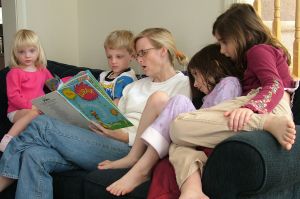Let’s Look At The Most Common Teaching Methods
So how in the world do you make a decision? All the teaching methods discussed below work and work well. The key is finding the method that works best for your family and then be consistent and focused.
The first step is deciding if you want to do traditional schooling, non-traditional schooling or a combination of the two. All home school materials basically fall into two main categories:
- textbook curricula and
- non-textbook curricula
The Textbook Method
 This traditional approach uses graded textbooks or workbooks that follow a scope and sequence. Each subject is covered in 180 daily increments per school year for a span of 12 years. Teacher’s manuals, tests and record keeping materials are usually available.
This traditional approach uses graded textbooks or workbooks that follow a scope and sequence. Each subject is covered in 180 daily increments per school year for a span of 12 years. Teacher’s manuals, tests and record keeping materials are usually available.
If you are homeschooling several children, typically you would purchase a grade level textbook curriculum for each child on each subject.
This method can also include video programs of actual classrooms using accompanying textbooks and supplies. Additionally, there are satellite schools, as well as universities, that offer lessons/courses on CD or on the Internet.
Some questions to ask before you choose the traditional textbook approach:
- If your child has been in a traditional school setting, did they perform well in a traditional classroom?
- Does your child like to have defined goals and can they complete assignments on their own without much supervision?
- Is your child academically oriented?
- Will you follow through with the lesson plans and pace your course of instruction?
Read more about the traditional textbook approach to homeschooling.
The Non-Textbook Method
Parents may choose a non-traditional teaching approach because they want to educate their children in a way that is uniquely home-based instead of bringing the traditional classroom home.
Here’s a brief explanation of the most common non-textbook teaching approaches.
The Classical Approach
 The Classical Approach to education will give your child a rigorously academic and comprehensive education from preschool through high school. The classical pattern of education is based on the Trivium which organizes learning around the maturing capacity of the child’s mind.
The Classical Approach to education will give your child a rigorously academic and comprehensive education from preschool through high school. The classical pattern of education is based on the Trivium which organizes learning around the maturing capacity of the child’s mind.
There are several questions to ask before choosing the classical approach:
- Does your family enjoy reading good literature?
- Do your children enjoy a rigorous academic program?
- Are you willing to spend time studying so you can teach your children things you may have never studied?
- Does your family like to study and discuss ideas that have influenced civilizations?
Read more about the classical approach to homeschooling.
The Unit Study Approach
 A Unit Study takes one topic or unit of study and combines different subjects to revolve around and tie into that topic. It can include language arts, science, history, geography, math and fine arts. Instead of studying several unrelated subjects, all subjects are included in a common theme or project.
A Unit Study takes one topic or unit of study and combines different subjects to revolve around and tie into that topic. It can include language arts, science, history, geography, math and fine arts. Instead of studying several unrelated subjects, all subjects are included in a common theme or project.
There are three main options for doing the unit study approach:
- You can purchase a complete unit study.
- You can use a prepared topical guide.
- You can create your own unit study from scratch.
There are no set rules for doing a unit study. They can be planned for a long range study such as a complete yearly unit study or they can be shortened by using a topical study guide.
Questions to ask yourself before choosing the unit study approach:
- Are you a fairly creative person or do you like everything laid out for you?
- Is it important for you to try to make learning interesting and fun or are you interested in just completing the assigned projects and assignments?
- Do your children have a variety of interests and different learning styles?
- Do you have the desire to be the creative force behind the development of the unit studies?
Find out more about the unit study approach to homeschooling.
The Living Book Approach
 The Living Books approach is based on the teachings of Charlotte Mason, a turn-of-the-century British educator who believed in involving children in real-life situations. She taught the children should be allowed to read quality books instead of worthless, inferior material that she called “twaddle.”
The Living Books approach is based on the teachings of Charlotte Mason, a turn-of-the-century British educator who believed in involving children in real-life situations. She taught the children should be allowed to read quality books instead of worthless, inferior material that she called “twaddle.”
She believed children should be allowed to develop moral and intellectual power by being taught good habits, by being involved in real-life situations, by reading wonderful, quality books and by being given plenty of time to play, reflect and create.
Some things to consider before choosing the Living Books approach:
- Does your family love to read, both alone and together?
- Does your family love to browse through bookstores or go to the library?
- Are you comfortable with not having a thoroughly structured school time?
- Will you follow through with teaching your children good habits and character qualities?
- Will you teach your children to learn on their own?
- Will you feel comfortable to allow time in your schedule to expose your children to nature, the arts and music?
Discover more about the Living Book Approach to homeschooling.
The Principle Approach
 The Principle Approach is a way of living, not just a way of educating children. The approach is applied to any subject by using the 4 Rs: Researching God’s Word, Reasoning from the researched Biblical truths/principles, Relating the truths/principles to the subject and the student’s character and Recording the application of the Biblical truths/principles in the student’s individual notebooks.
The Principle Approach is a way of living, not just a way of educating children. The approach is applied to any subject by using the 4 Rs: Researching God’s Word, Reasoning from the researched Biblical truths/principles, Relating the truths/principles to the subject and the student’s character and Recording the application of the Biblical truths/principles in the student’s individual notebooks.
The Principle Approach is based on the seven Biblical principles upon which our country was founded and by which many of the founding fathers were educated: 1. Individuality; 2. Self-Government; 3. Christian Character; 4. Conscience; 5. the Christian Form of Government; 6. The Seed of Local Government; 7. the American Political Union.
Some things to consider before choosing the Principle Approach:
- Do you have a deep concern to apply Christian principles to your family and nation?
- Will your child assume responsibility for a great deal of learning on his own?
- Does your child like to express himself through writing?
- Are you willing to do extensive Biblical research and teaching preparation?
Learn more about the unit Principle Approach to homeschooling.
The Unschooling Approach
 Unschooling was defined by John Holt, a 20th century American educator who taught that children have a strong desire to learn and a curiosity that drives them to learn what they need to know when they need to know it. He believed a child’s desire and curiosity for learning are destroyed by the usual teaching methods.
Unschooling was defined by John Holt, a 20th century American educator who taught that children have a strong desire to learn and a curiosity that drives them to learn what they need to know when they need to know it. He believed a child’s desire and curiosity for learning are destroyed by the usual teaching methods.
Today, unschooling is any less structured learning approach that allows children to pursue their own interests along with parental support and guidance. The child should be surrounded by a rich environment of books and learning resources, and have an adult in his life that models a lifestyle of learning and wants to interact with the child. The child studies formal academics when the need arises.
Many Christian homeschoolers who have definite goals, but favor less structured schooling prefer to be called “relaxed home educators” instead of unschoolers.
Some questions to ask yourself before choosing the Unschooling or Relaxed Schooling Approach:
- Are you comfortable with have less structure and fewer pre-set goals?
- Do your children have strong interests that they want to pursue?
- Do your children love learning and have a lot of natural curiosity?
Find out more about the Unschooling or Relaxed Schooling Approach to homeschooling.
The Mixed/Eclectic Approach
Many families use a blend of the different educational approaches. They may use traditional textbooks for math, spelling or science, but they build unit studies around historical periods that include reading, language arts, music, art and philosophy. They may also choose computer programs to teach keyboarding, business skills and writing.
After looking over all these different approaches to learning, remember that they all work and work well. The trick is discovering the one that will work best with your family’s lifestyle and your children’s learning style. Then it’s your goal to share your love of learning by being consistent and raising productive children who love to learn.
Susan Mueller is a veteran homeschool mom who encourages families how to Raise Productive Leaders Who Love Learning at www.EducatingToday.com. She and her husband, Ron, homeschooled their children from birth through graduation and helped launch them into adulthood and business.
She loves to visit and encourage other homeschool parents to home school with freedom and grace. You can join her mailing list and get a free copy of her e-book “The Proverbs 31 Family” at http://www.EducatingToday.com/prov31/.